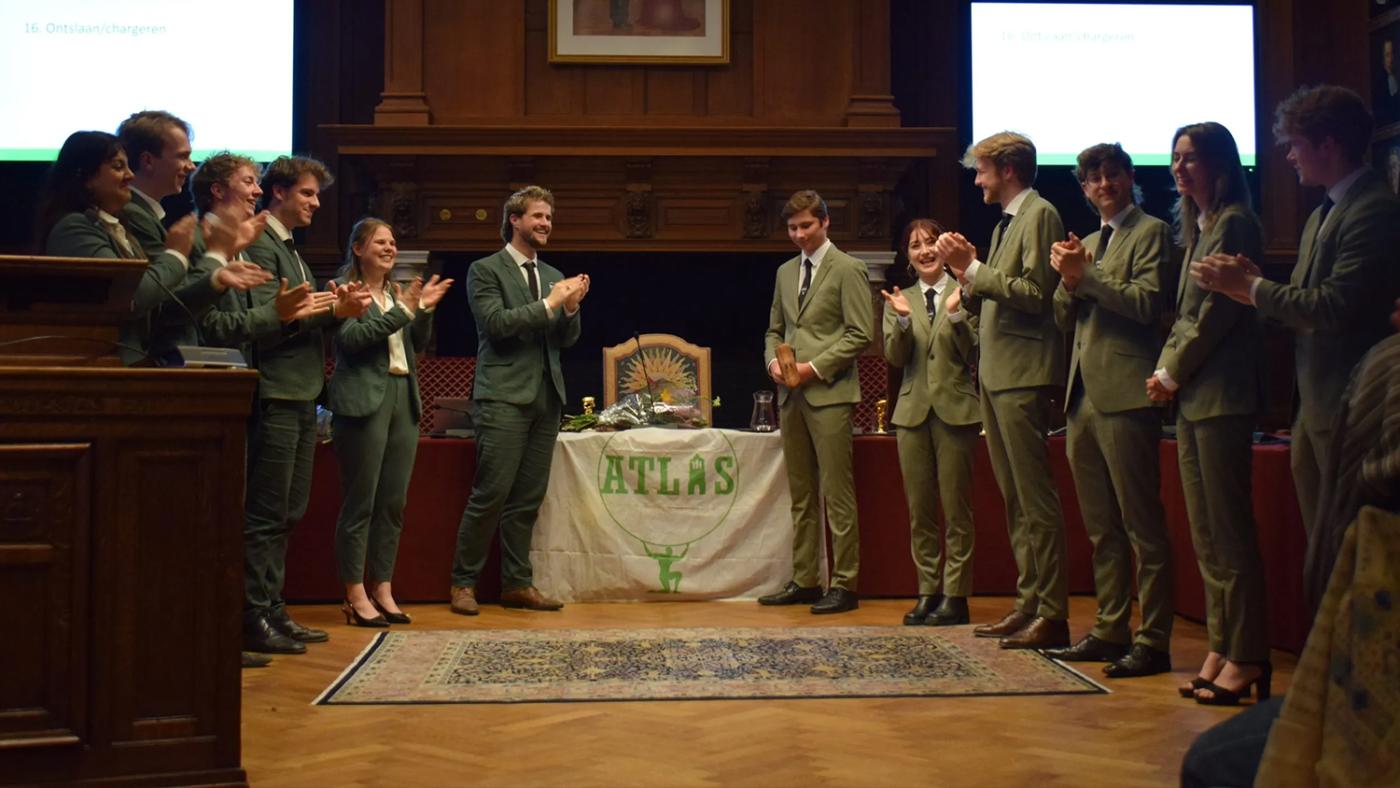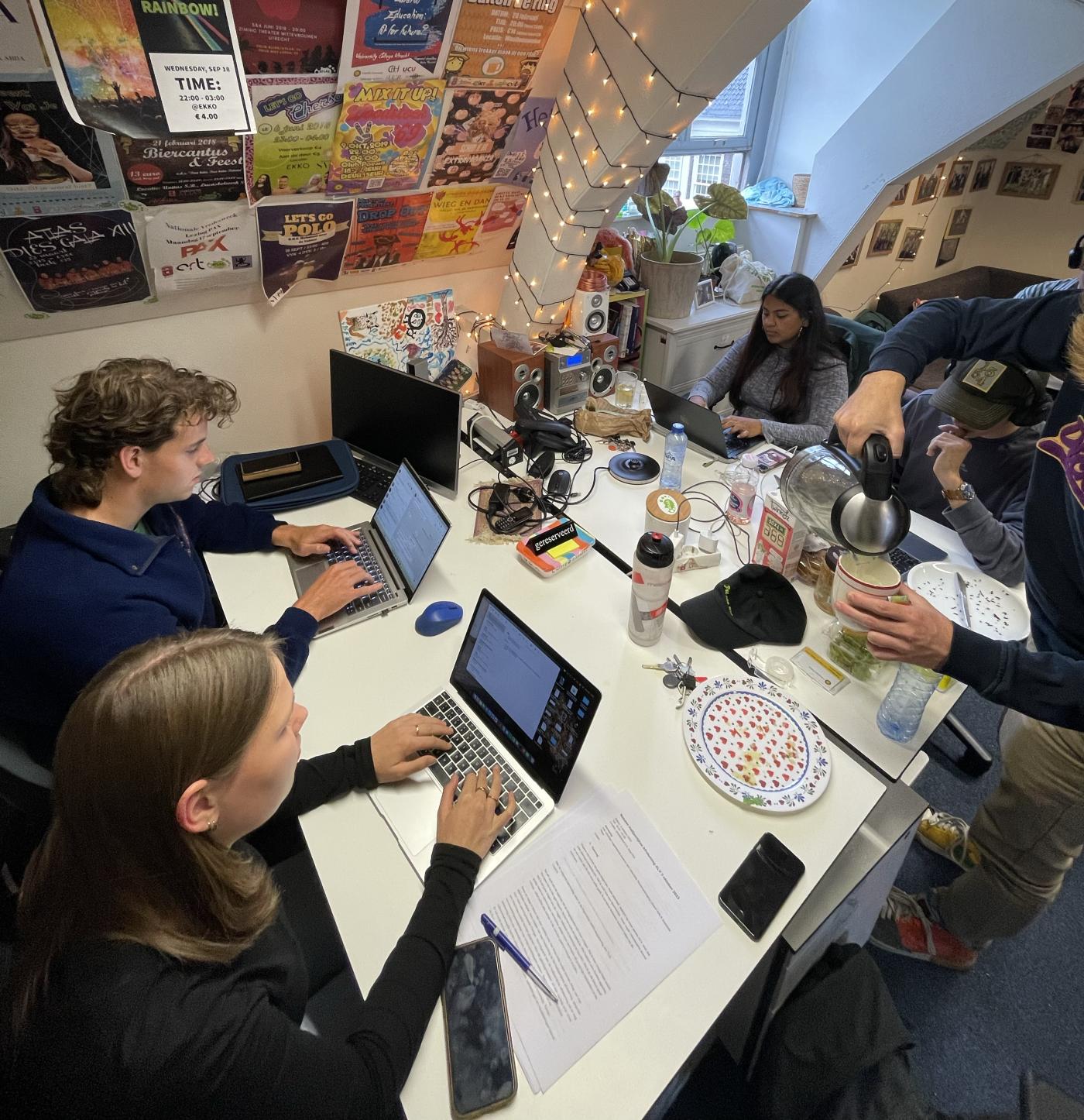Student shares his experiences on the board of study association Atlas
My year as a board member: overworked, underpaid and facing extinction

Last academic year, I became a board member for Atlas, a medium-sized study association for Liberal Arts & Sciences (LAS), together with five other students. My year on the board – actually, one year and a half, considering the induction period, when the new board devises the policy for the following year – was a bizarre ride with memorable highs and certainly several lows. If compensation and expectations don't change, I fear the idea of serving on the board of a study association in the Faculty of Humanities will become unattractive for most students, and study associations will die out as a result.
Student boards operate based on an exchange of interests between an individual and an institution. In this case, the individual is the student and the institution can be seen as the university, the faculty or the study programme. Both parties contribute and benefit from the exchange. Student board members give their time and energy in exchange for a "rich" experience and a small financial compensation. The institution provides that compensation and receives active community building in return. Now that life is becoming more and more expensive for students and the government is threatening to fine them for taking longer to graduate, this exchange is under pressure.
Money
The most practical problem that board members encounter is financial. The monthly compensation from the university is called a "board grant". Board grants are minimal for the Humanities and far from sufficient to cover costs such as travel expenses and clothing. When you join a board, you incur more costs. For example, a delegation from the board is expected to be present at all activities for the sake of student safety and to represent the association. No matter how much fun a trip abroad or a winter sports holiday is, I too had to pay the membership fee.
I also had to pay tuition fees, even though it was not possible for me to take eight courses. Taking four courses is already a challenge when you're serving on a board. In theory, board work is part-time, so I should have been able to take four courses; in practice, however, we were required to work at least 40 hours a week. This means I could not take a side job in addition to my board work.
Wellbeing
Due to the ambitions of a study association, serving on the board is a hard job. Every year, the new board needs to write a policy plan in which it promises to take on certain matters, even though it is already untenable to complete the existing to-do list with a part-time working week. Ambition is good and necessary, but everything you throw on top of an already toxic work-life balance is excessive and unhealthy. For me, being on the board often felt like juggling twenty balls without knowing how to juggle. Based on my experience, I would discourage new board members from being ambitious, but that's not the tradition. Besides, it is understandable that a new group would want to leave a legacy so that, later, they could say: "Look, we did that!"
I also hardly had any free time due to the full schedule of a board member. Since June 2023, my agenda has been dominated by association plans, gatherings, drinks, activities and meetings. Sounds nice, I know, and I often drew enough energy from this, but there was no room for activities outside of Atlas. It takes a lot of planning to see family and friends.
Even when I was free, the Atlas circus often continued as usual. I got constant notifications on my phone as a result of the informal nature of the position. It was also difficult to stick to “healthy” office hours when most of our activities were after 5:00 pm. Bestuurlijk Actief offered some useful courses for board members, such as one on how to have efficient meetings or a mindfulness workshop. Without time and energy, however, those courses were of no use. It is nice to talk about mental health, but it takes more than words and tricks. The workshop Preventing a Burnout (available in Dutch only, Ed.), specifically designed for board members, says enough about the status quo.
At the Faculty of Humanities, board members' mental health is high on the agenda. This means they are listening to our problems. However, the solutions offered are often not sufficient, as evidenced by the Study Association Consultation (Dutch acronym: SVO). Talking about mental health is useful, but it is counterproductive when attendance is mandatory for all associations and absence can have consequences for board grants in the future.
The Faculty of Humanities is not the only one where board members are suffering from physical and emotional exhaustion. Two former faculty council members from the Faculty of Social Sciences, as well as former board members of Djembé, the study association for Cultural Anthropology, reported over a year ago that two out of three board members in their faculty felt mostly or always mentally exhausted.
Serving on a study association board for a year should be an educational time full of valuable experiences, but in my case, it was a foretaste of an underpaid career heading for burnout. Many people around me had complaints that indicated they were overworked and not everyone dealt with that wisely. Therefore, I do not see it as a coincidence that we've had a board member drop out of our board two years in a row.

Financial frustrations and inequality
It is painful and unfair to see that policymakers at the national, university and faculty levels, who hold the reins and determine the rules of the game, lack this awareness. The government should be the first one paying attention to this. The Minister of Education, Eppo Bruins, recently announced there is no room to make exceptions in the implementation of a fine for students who take longer than one additional year to graduate. After all, such a policy has an impact on the wallets of all students, especially those who already have a small budget. If the fine is implemented, full-time board members will not be allowed to fail a single course. Otherwise, they'll be forced to pay 3,000 euros.
The effects of this come faster than you'd think. The cancellation of the Batavieren race is a poignant example. I ran my lungs out last May, but the 53rd edition will not happen because they couldn't find enough students to organise it. This is partly due to increasing study pressure and the upcoming fine.
Interest groups such as the National Student Union (LSVb) and political opposition parties are raising the alarm about how low remuneration and the upcoming fine are endangering board work. In addition, the distribution of money is often disproportionate in Utrecht and changing that seems almost impossible in such a cumbersome and bureaucratic university. During the last redistribution of administrative grants among the study associations of the Faculty of Humanities, my association came out on top. The faculty asked all study associations to show solidarity, but the majority remained silent.
The missing realisation is that a board grant is a pleasant side effect for a small association, but for those working for bigger associations, it is often a necessary source of income. I am talking about an amount comparable to the compensation that members of education committees receive for their tasks, which take up a maximum of 4 hours per week. Like them, we receive a board grant that amounts to 70 euros per person each month. If you see it as a thank you, that seems like a nice amount, but not if you have to live on it. Converted, we are talking about 55 cents per hour, while the central government uses a guideline of a maximum of 5.50 euros per hour for volunteer allowances. Moreover, if my association had been assigned to another faculty, we would have received five times our grant.
It feels frustrating to hear friendly board members talk about compensations that could almost pay the rent for their rooms and they could also claim the costs of a three-piece suit. As Koos Goudswaards recently wrote in the national newspaper De Volkskrant, it is the university's financial choice not to give the Humanities the funding they need. Yes, I'm talking about the programmes that are in danger of disappearing in Utrecht and Leiden. The most brutal examples of a faculty that is already subject to standard cutbacks are finally being brought to light.
That brings me to the next distribution-related frustration: why do associations based on a drinking culture get so much more money? The redistribution of board grants for the so-called "social" associations was big news within our ranks. The new distribution model, aimed at fairness and transparency, has resulted in a decrease of at least 10,000 euros for seven student associations, including cultural associations USKO and USConcert. On the other hand, a big group of associations are making significant progress. In addition to justified windfalls for several, sports associations, the fraternity USC is getting almost 13,000 euros more. More beer, hurray.
I worry about the increasing differences in allocated amounts. Are we only going to look at the number of members and whether or not the association owns a building? Seems a bit too simple and lazy to me. I hope the university will reflect a bit more reflection when it comes to study associations.

...So you want to be a board member?
You don’t have to do it for the money. You are paid in experience, which is also valuable. If I could go back in time, I would still have made the same choice. After all, I made new friends and developed skills that will come in handy later on. However, your mental health should be on point. Candidates' mental stability has been an important criterion in recent years, sometimes at the expense of the creativity or energy someone else could bring.
In addition, you do not talk about these "problems" outside the board because it is necessary to ensure the succession. We're not talking about lying, but you shouldn't scare off future candidates, either. The story we tell is: “Yes, it is not a cheap year, but…” That “but” is completely inappropriate as the way we have arranged our board year will no longer be financially or mentally sustainable in a few years.
As a friend pointedly and ruefully remarked, “A call for more money falls on deaf ears in this environment, certainly as a humanities scholar.” However, that does not mean that, in times of cutbacks and fines, we should shift the burden to a single group. We urgently need more recognition and appreciation for student board members. Only students who have been through this experience can empathise with the pressure the current range of tasks entails. However, I do not expect a magic solution directly linking the feeling of recognition and appreciation to what our faculty really needs, which is financial breathing space. Although a cultural change is necessary to reduce the range of tasks, that takes time. Therefore, let's start with fairer compensation for board members.
In addition, boards and associations are not all created equal. That is precisely why it is so complicated to find a solution that works for everyone. More financial support would help enormously, but it does not solve all problems. Nor does my faculty have a monopoly on financial hard times. The cutbacks affect the entire education sector.
So, would I recommend a board year to a new generation? I don't dare say "no" yet. The past year certainly gave me more than it cost me, although my bank account and lost friends would think differently. I do have a reservation for the near future. The trend is that students will have a harder time financially, partly due to the aforementioned fine. Combined with the low board grants, it is becoming increasingly difficult to argue in favour of joining a board. Perhaps naively, I still hope that times will change quickly and we will do more than just talk about it.